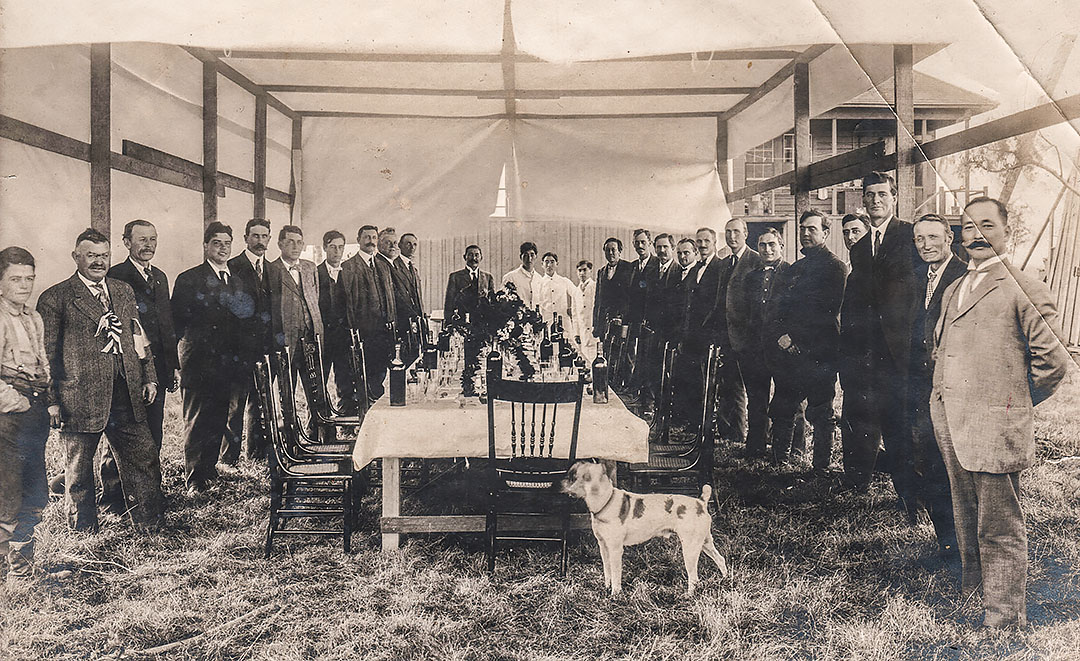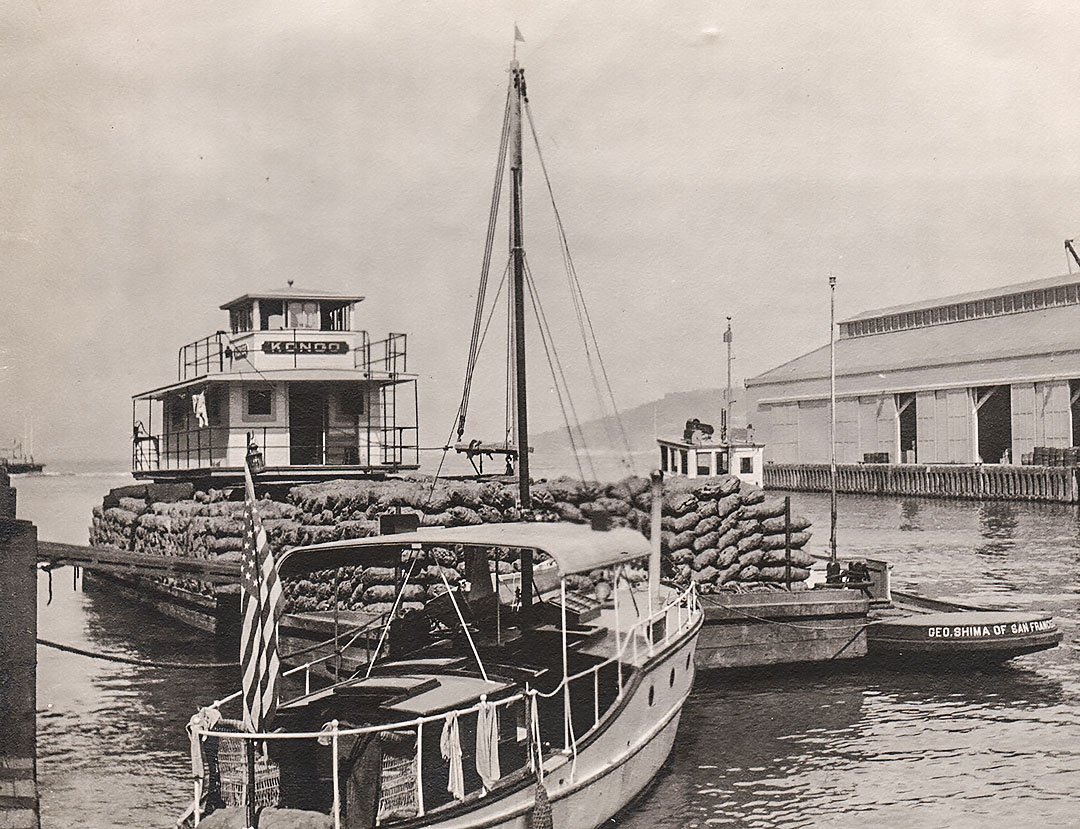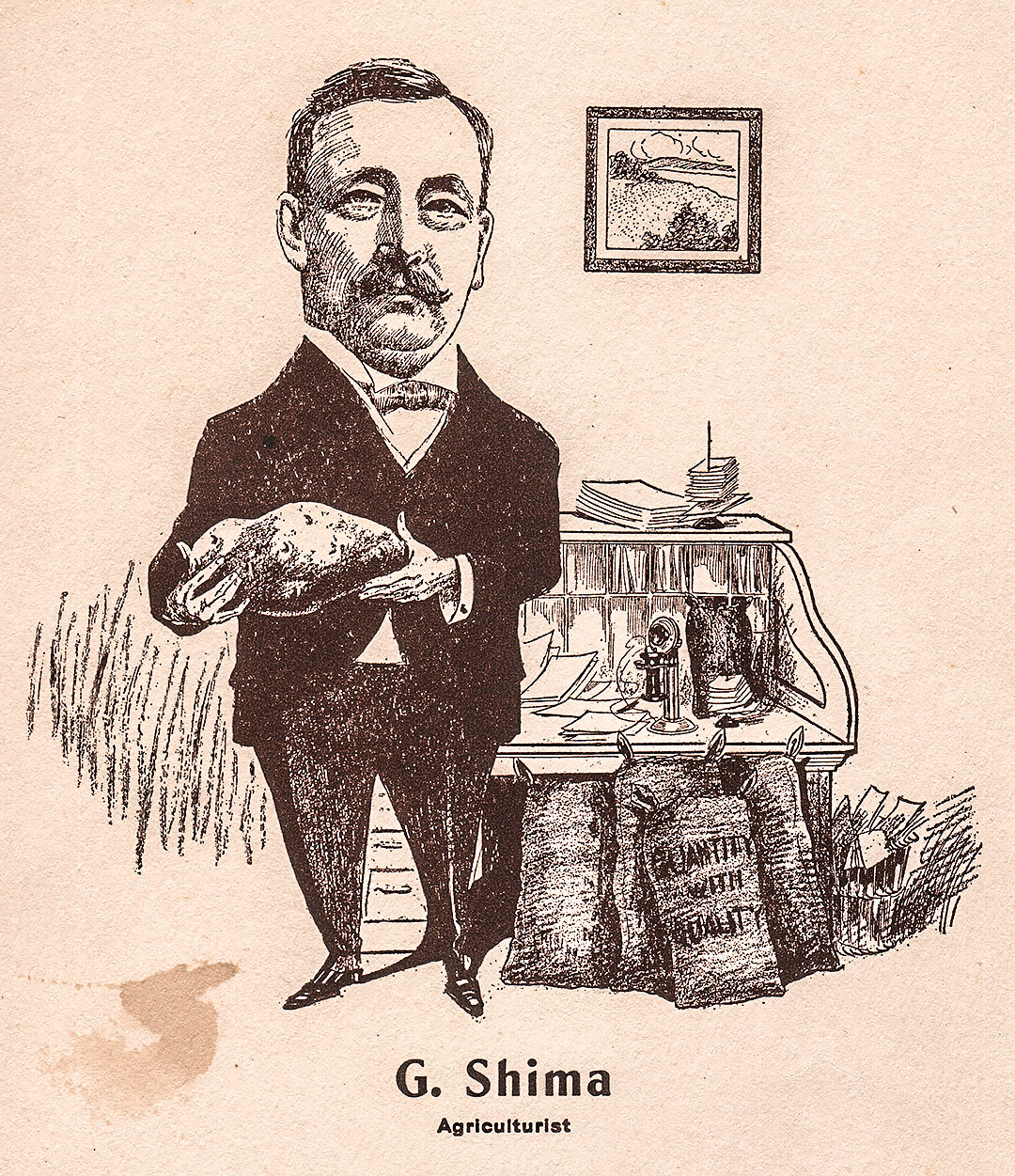George Shima
The Well-known “Potato King” and Japanese Leader
- By David Stuart
- Photographs by San Joaquin County Historical Museum
- February 12, 2020
- 11:47 pm
- 4 Comments
In the 1920s, Shima had to dismantle his farming empire due to the Alien Land Laws. He then became a leader in the fight against these laws. He was President of the national Japanese Association of America from 1908 through 1925, the most important leader for Japanese in the United States.

Japanese immigrant Ushijima Kinji (1864-1926), later known as George Shima, arrived in the Sacramento-San Joaquin Delta in 1889 and worked his way from migrant laborer to a top farmer. Shima’s innovative farming techniques produced top quality potatoes, which brought a premium price on the market. The peat soil of the Delta was ideal for growing smooth-skinned, high-quality potatoes, and Shima perfected the sub-irrigation of the crop using narrow trenches or “spud ditches” for every 30 rows of potato plants and he “branded” his quality potatoes by using distinctive bags.

Shima was a moderately-successful potato farmer in the early 1900s, when he struck up an important friendship with Lee Allen Phillips, a Los Angeles attorney, financier, and Delta reclamation agent.
“He and Lee Phillips…had a lot of confidence in each other. Phillips recognized Shima as the producer, the man who could grow things. Shima saw in Phillips the man who made the big deals in land, who got the backing…. [They] had a unique arrangement. Just two men, in mutual confidence, risking hundreds of thousands of dollars on the other fellow’s honesty and reliability—Phillips, the dreamer, and Shima, the man who made a lot of dreams come true.” (J.C. McCarthy, former superintendent of operations for Lee Phillips, Stockton Record)
Phillips would purchase Delta land, arrange for construction of levees to reclaim a tract or island, then lease the land to Shima, who moved in crews of Asian workers to clear the tules and plant an initial grain crop. After that initial crop, potatoes were planted. Shima leased as many as 14,000 acres from Phillips.

By 1906, Shima was growing more potatoes than any other farmer in the world. He produced 85 per cent of the state’s potato crop, and his “Shima Fancy” potatoes were valued at more than $18 million (more than $200 million in today’s dollars). He became famous nationally when the Stockton Record published a widely-reprinted story on “The Potato King.”
Shima had three riverboats built in Stockton to transport his potatoes to the Bay Area for wholesale distribution and his lavish yearly entertainments for bankers, produce merchants, and journalists became legendary. He, Lee Phillips, and other capitalists financed the construction of the Stockton Hotel, the luxury hotel that still stands in downtown Stockton.


Shima first purchased—rather than leased—Delta farmland in 1910: 800 acres just north of the potato farm of the Chinese “potato king” Chin Lung (whose story is coming in a subsequent issue of SoundingsMag) on what is now known as the Shima Tract. A year later he bought 800 acres on McDonald Island west of Stockton. His success as the first Japanese American millionaire, his visibility as a result of the Record article, and these land purchases apparently contributed to the statewide agitation for the Alien Land Law that a couple years later forbid Japanese to purchase land and severely restricted land leasing.
Shima was a major stockholder in California Delta Farms, formed in 1912 by Lee Phillips through the merger of six Delta land companies. California Delta Farms owned 37,400 acres of Delta farmland.
In the 1920s, Shima had to dismantle his farming empire due to the Alien Land Laws. He then became a leader in the fight against these laws. He was President of the national Japanese Association of America from 1908 through 1925, the most important leader for Japanese in the United States.
Shima also left a legacy of supporting students attending the University of California and Stanford University. He is memorialized by the Shima Center at San Joaquin Delta College in Stockton.

The San Joaquin County Historical Museum in Micke Grove Park has included George Shima’s story in an exhibit panel on the Delta Water Path exterior exhibition.
###n
David Stuart recently retired as the executive director of the San Joaquin County Historical Society. Previously, he directed the Sacramento History Museum, the Sacramento Science Center, and museums in Ventura. His family settled in the Delta in 1860.
- By David Stuart
- Photographs By: San Joaquin County Historical Museum
- February 12, 2020
- 11:47 pm
- 4 Comments

Leave a Reply
4 Comments
From San Joaquin County Historical Society, April 20, 2020:
#SJCStories
Ushijima Kenji, known in America as George Shima, was the Potato King. He immigrated to the US in 1889 through San Francisco, and before long he was working in the Sacramento-San Joaquin Delta as a migrant laborer. By the 1890s he had become an organizer, working as a labor contractor for other Japanese migrant workers.
In the late 1890s (1897, according to records at the Museum) Shima began to lease land to the West of Stockton, and found that after draining the land, potatoes were an ideal crop for the soil and climate conditions. Between 1900 and the advent of WWI in 1914, he rapidly expanded his business into an empire. He used advanced Fordist management techniques and worked with local mechanical engineering firms such as Holt Brothers Manufacturing and Samson Iron Works to innovate technology on the farm. His headquarters in downtown Stockton in the Japanese Quarter, West of El Dorado Street, were the center of a dynamic enterprise. By 1920, he had cornered the potato market, with over 85% share in California potato agriculture. He was “The Potato King.”
Shima faced virulent racism throughout his rise to business power. Despite providing much of the capital to build the Hotel Stockton (he actively advocated for the building’s construction, built in 1910), he was denied having his name on the building along with other investors due to his ethnicity. While trying to buy a home in Berkeley, he was organized against by local realtors. Articles in the Stockton Daily Evening Record from during his lifetime show that he was a victim of what we would today call hate crimes.
Despite this, he worked hard to better the rights of immigrants in California, and to improve the City of Stockton. He was the founding President of the Japanese Association of America, and actively fought the California Alien Law Act of 1913, taking out editorials in newspapers across the state against the law. He also sponsored local Japanese language newspapers, such as the Stockton Times, and was an advocate for the Japanese and Chinese communities of Stockton (famously helping to build the Nippon Hospital). He further spent large sums of money in promoting local agriculture at County, State, and National fairs and expos, earning him the praise of local agricultural interests.
Shima passed away in 1926 of a stroke while away on business in Los Angeles. He was that day awarded the Fourth Rank of the Order of the Rising Sun by Hirohito, the Emperor Showa. A cult figure in Japan, known as a symbol of success in Japanese settler communities, his death was reported on by newspapers across that Country. In Stockton, the Japanese community deeply mourned the loss of its greatest advocate. Shima Tract in the Delta, the Shima Center at Delta College, and numerous plaques and statues in his hometown of Kurume, Japan, are dedicated in his honor. Historians at Kurume University in Japan are actively working on a graphic novel-biography of his life.
#LocalHistory #SJCStories
Thanks so much for this informative addendum, Dave.
I spent my childhood on shima tract an have often wondered the history of that island …it is smaller now due to the building of l-5 .. it has a very peaceful feel to it as i still walk the levee there the packing sheds are gone as are the labor camps the orchards an alfalfa fields have replaced the sugar beet ..tomato..asparagus fields .. housing has replaced the pastures where beef were raised ….just a few of my thoughts … excellent article..thank you !!!
Excellent article!